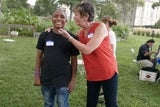

At Children’s Hospital of Philadelphia (CHOP), multiple staff members from the Diabetes Center work as a team with each patient and family to help them manage their child’s diabetes.
We have endocrinologists, nurse practitioners, certified diabetes educators, social workers, nutritionists, child life specialists, and a psychologist who examine, teach, and support each family. For most families, this comprehensive team approach puts their child on a path to successful diabetes management.
However, there are some families, often with lower socioeconomic status or from vulnerable, underserved populations, whose circumstances are so complex and stressful that they struggle to manage their child’s illness, resulting in poorly controlled diabetes, frequent Emergency Department visits, increased hospitalizations, and higher complication rates.
Starting with an internal grant-funded pilot program in 2016, CHOP has added a new member to the diabetes team for those families—a community health worker (CHW) —to provide the additional support they need to overcome the hurdles that have prevented them from safely and consistently managing their child’s diabetes.
Success stories
Here are a few examples of how our CHWs have improved families’ ability to help their children:
M.W.’s family was at risk for eviction when the CHW began working with them. The CHW advocated for the family throughout the eviction process, helped negotiate with their new landlord, and secured assistance from the Public Health Management Corp. for moving costs. In a more stable environment, we are already starting to see improvements in M.W.’s glycemic control.
In another instance, when the CHW began working with H.A.’s family members, they were experiencing housing, food and utility insecurity. The electricity had been disconnected, and they were worried their child’s insulin could not be refrigerated. The CHW worked with the utility company to have service reconnected. Also, the father, a single parent, was unable to read medical instructions. The CHW worked closely with him on addressing this, and he is now enrolled in second level education to improve his literacy. At the end of one year in the program, H.A.’s hemoglobin A1c had decreased from 12.3% to 7.6%.
J.A., who also has GERD and asthma, had missed appointments with his diabetes team and had attended the Emergency Department several times with diabetic ketoacidosis before his family started working with a CHW. His mother struggled to explain to his diabetes team the social challenges the family faced that compromised diabetes management. The CHW accompanied the family to appointments and facilitated communication between J.A.’s mom and his team. That relieved frustrations on both sides and enabled the development of health strategies that took his comorbidities into consideration and, just as importantly, were doable. With that plan in effect, J.A.’s hemoglobin A1c had decreased by 2% within 6 months.
T.M.’s family faced food, utility and housing insecurity. During a home visit, the CHW discovered the family was using its limited income to pay out of pocket for glucose test strips—which should be have covered by insurance. The CHW helped the family collect the required documentation, file for reimbursement and set up insurance coverage for supplies going forward. After six months, T.M.’s family reported it had enough money for food and utilities.
Community health worker’s role

The CHW, as a nonmedical person, helps families manage the challenging parts of life that go beyond medical matters. They aim to help families get on track to successfully manage their child’s diabetes and to position children to develop the life-long skills needed to manage their health now and in the future.
The community health worker helps the parents and child identify the social determinants of health issues that make it difficult to focus on their diabetes care, create a plan to address these challenges and then work toward solutions.
Things a CHW can help families tackle are:
- Arranging transportation to appointments and helping families navigate the healthcare system.
- Creating better communication between the family and the diabetes team to build a strong relationship
- Making connections with community support services for children and their parents (such as mental or behavioral health providers, if necessary)
- Identifying where the family can get healthy food and learning how to prepare nutritious meals for the entire family
- Working with the child’s school to facilitate care during school hours and for extracurricular activities, and to improve communication between the school and family
- Ensuring living conditions (housing, utilities, etc.) are not compromising diabetes management
Our CHWs have also been able to obtain donations to provide winter coats and school supplies to families in need.
While CHWs have a basic understanding of diabetes and its management, they are not a source of medical information and cannot answer specific diabetes management-related and health questions. They can help families connect with someone from the Diabetes Center who will answer specific health-related questions.
Each CHW works with an individual family for 12 months, visiting more frequently at the beginning and then, as progress is made, less frequently.
Building a community
One recurring theme community health workers report their families face is social isolation. In an effort to combat this feeling, we have developed community health worker-led community support events. These community-focused events provide opportunities for families to connect with each other and the diabetes provider team, support groups led by social workers and community health workers, and a variety of community-based vendors and resources.
Children and teens also have the chance to get to know other kids with type 1 and, through facilitated discussion groups, share their experiences and learn coping techniques.
More than 60 families regularly attend these events. These events have continued to grow in size since they started in early 2019.
Featured in this article
Specialties & Programs

At Children’s Hospital of Philadelphia (CHOP), multiple staff members from the Diabetes Center work as a team with each patient and family to help them manage their child’s diabetes.
We have endocrinologists, nurse practitioners, certified diabetes educators, social workers, nutritionists, child life specialists, and a psychologist who examine, teach, and support each family. For most families, this comprehensive team approach puts their child on a path to successful diabetes management.
However, there are some families, often with lower socioeconomic status or from vulnerable, underserved populations, whose circumstances are so complex and stressful that they struggle to manage their child’s illness, resulting in poorly controlled diabetes, frequent Emergency Department visits, increased hospitalizations, and higher complication rates.
Starting with an internal grant-funded pilot program in 2016, CHOP has added a new member to the diabetes team for those families—a community health worker (CHW) —to provide the additional support they need to overcome the hurdles that have prevented them from safely and consistently managing their child’s diabetes.
Success stories
Here are a few examples of how our CHWs have improved families’ ability to help their children:
M.W.’s family was at risk for eviction when the CHW began working with them. The CHW advocated for the family throughout the eviction process, helped negotiate with their new landlord, and secured assistance from the Public Health Management Corp. for moving costs. In a more stable environment, we are already starting to see improvements in M.W.’s glycemic control.
In another instance, when the CHW began working with H.A.’s family members, they were experiencing housing, food and utility insecurity. The electricity had been disconnected, and they were worried their child’s insulin could not be refrigerated. The CHW worked with the utility company to have service reconnected. Also, the father, a single parent, was unable to read medical instructions. The CHW worked closely with him on addressing this, and he is now enrolled in second level education to improve his literacy. At the end of one year in the program, H.A.’s hemoglobin A1c had decreased from 12.3% to 7.6%.
J.A., who also has GERD and asthma, had missed appointments with his diabetes team and had attended the Emergency Department several times with diabetic ketoacidosis before his family started working with a CHW. His mother struggled to explain to his diabetes team the social challenges the family faced that compromised diabetes management. The CHW accompanied the family to appointments and facilitated communication between J.A.’s mom and his team. That relieved frustrations on both sides and enabled the development of health strategies that took his comorbidities into consideration and, just as importantly, were doable. With that plan in effect, J.A.’s hemoglobin A1c had decreased by 2% within 6 months.
T.M.’s family faced food, utility and housing insecurity. During a home visit, the CHW discovered the family was using its limited income to pay out of pocket for glucose test strips—which should be have covered by insurance. The CHW helped the family collect the required documentation, file for reimbursement and set up insurance coverage for supplies going forward. After six months, T.M.’s family reported it had enough money for food and utilities.
Community health worker’s role

The CHW, as a nonmedical person, helps families manage the challenging parts of life that go beyond medical matters. They aim to help families get on track to successfully manage their child’s diabetes and to position children to develop the life-long skills needed to manage their health now and in the future.
The community health worker helps the parents and child identify the social determinants of health issues that make it difficult to focus on their diabetes care, create a plan to address these challenges and then work toward solutions.
Things a CHW can help families tackle are:
- Arranging transportation to appointments and helping families navigate the healthcare system.
- Creating better communication between the family and the diabetes team to build a strong relationship
- Making connections with community support services for children and their parents (such as mental or behavioral health providers, if necessary)
- Identifying where the family can get healthy food and learning how to prepare nutritious meals for the entire family
- Working with the child’s school to facilitate care during school hours and for extracurricular activities, and to improve communication between the school and family
- Ensuring living conditions (housing, utilities, etc.) are not compromising diabetes management
Our CHWs have also been able to obtain donations to provide winter coats and school supplies to families in need.
While CHWs have a basic understanding of diabetes and its management, they are not a source of medical information and cannot answer specific diabetes management-related and health questions. They can help families connect with someone from the Diabetes Center who will answer specific health-related questions.
Each CHW works with an individual family for 12 months, visiting more frequently at the beginning and then, as progress is made, less frequently.
Building a community
One recurring theme community health workers report their families face is social isolation. In an effort to combat this feeling, we have developed community health worker-led community support events. These community-focused events provide opportunities for families to connect with each other and the diabetes provider team, support groups led by social workers and community health workers, and a variety of community-based vendors and resources.
Children and teens also have the chance to get to know other kids with type 1 and, through facilitated discussion groups, share their experiences and learn coping techniques.
More than 60 families regularly attend these events. These events have continued to grow in size since they started in early 2019.
Recommended reading
Diabetes Center

Children with diabetes and their families find care and education at the Diabetes Center at CHOP so they can live full lives.
Emotional and Lifestyle Support at the Diabetes Center

The Diabetes Center offers emotional and lifestyle support services for children with diabetes and their families.
Contact us
Diabetes Center